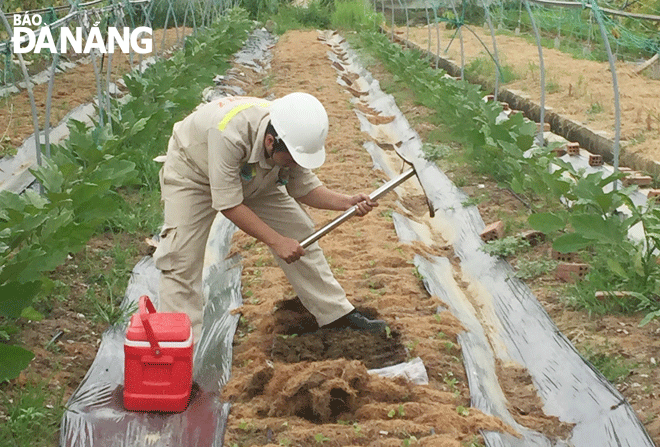Science and technology-based organic vegetable production prove initially effective
After more than 3 years of implementation, the ‘The application of science and technology to build an organic vegetable production model in Da Nang’ project has brought about initial socio-economic effects for production units as well as the development and production potential of organic vegetables in the city.
 |
| A staff member from Technical Centre for Quality Assurance and Testing Centre No 2 (QUATEST 2) collects soil samples at a location where the organic vegetable production model is expected to be deployed. Photo: M.Q |
From buying a large amount of vegetables to serve cooking, practitioners and staff of the Bau Bang Drug Rehabilitation Centre in Hoa Bac Commune, Hoa Vang District have produced 180 - 200kg of root and leafy vegetables of all kinds every day by themselves.
The above-mentioned quantities of vegetables are all organic products produced by applying science and technology.
The Bau Bang Drug Rehabilitation Centreis one of the two locations to have been selected to implement the aforementioned project under the programme of supporting the transfer of scientific and technological advances to promote socio-economic development in rural, mountainous and ethnic minority areas in the 2016 - 2025 period.
Implemented by the Centre for Biotechnology under the Da Nang Department of Science and Technology, the project started in November 2018 at a total budget of about VND4.6 billion, including many contents, in which focusing on promoting technology transfer, building an organic vegetable production model on a total area of 3.5ha in Hoa Vang District.
The project contributes to improving the living conditions of trainees and helping them access new jobs after re-integrating into the community. In terms of economic efficiency, the project creates favourable conditions for the centre to access the organic vegetable market in Da Nang, improve the value of agricultural products, and find suitable consumption directions for agricultural products.
Given the high effectiveness of the project, up to now, the Bau Bang centre has expanded the vegetable growing area from 1ha to 2.2ha, of which 0.5ha is covered by a net house.
Ms. Nguyen Thi Thanh Thuy, Deputy Head of Science and Technology Service and Experimentation Station under the Da Nang Biotechnology Centre, said that the organic vegetable growing model at Bau Bang facility can be evaluated as a model for organic economy, circular economy.
After participating in the model, the vegetable products produced from the project are abundant, not only meeting the daily kitchen needs at the facility but also being commercialised at a number of renowned organic food stores in the city such as An Phu Farm, Greentech Food and Winmart or being sold to trainees’ families.
In fact, the environmental effect is the most obvious. Organic production means an environmentally-friendly and safe production method for the parties involved.
Organic farming areas create a greater diversity of plants and animals, more fertile soils, higher carbon sequestration, lower greenhouse gas emissions, as well as reduce surface water oxidation and the leaching of nutrients into groundwater, especially without causing burden on the ecosystem due to pesticides and herbicides.
“The product consumption market in Da Nang is known through many different distribution channels such as clean agricultural stores, collective kitchens, hotels, schools, supermarkets, traditional markets, and commercial sites as well as the municipal authorities-launched trade promotion programmes. The market for clean agricultural products in Da Nang is quite bustling, promising many prospects due to the increasing public demand. This is an advantage for suppliers and manufacturers in the city to have the opportunity to conquer the market. Through the implementation of the project, the Centre for Biotechnology has developed the capacity to support the implementation of organic vegetable production projects, ready to actively participate in the development of organic agriculture. opportunities in Da Nang and other localities with other needs”, said Ms. Thuy.
The project has 2 technical processes for organic farming, built 2 models of organic vegetable production, organised the training for 12 junior technicians of the model and 7 trainees outside the project, offered 3 training courses for 150 turns of vegetable growers in Hoa Vang District, granted certifications for 16 organic vegetable products at the implementation sites. An important result is that the total output of vegetables under the project's crops has reached 181.7 tonnes, reaching the initially-set plan.
Reporting by MAI QUE – Translating by A.THU